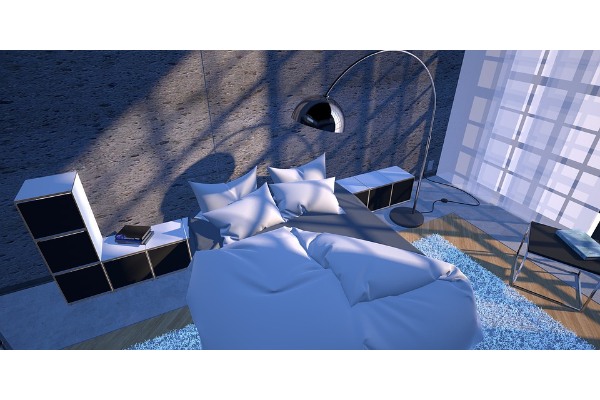The majority of us find that our bedrooms are the best spaces for sleeping, relaxing, and avoiding outside noise. You will undoubtedly feel more relaxed if you soundproof your bedroom. Therefore, choosing the appropriate soundproofing system is crucial when building or renovating your room. There are many ways to keep unwanted noises out of your bedroom. We’ve put together this comprehensive guide to soundproofing a bedroom in 13 different ways as a result. Discover more by reading on!
What Is Soundproofing?
If there is excessive noise around you, soundproofing your house or apartment might be the logical solution. In order to reflect, suppress, diffuse, and absorb noise or sound coming from a specific source, acoustic treatment is used in the process of soundproofing. This can be done, among other things, by using double-glazed windows to block the entry of outside noise or by insulating the building from various sources.
Why Soundproof A Bedroom?
The good news is that you actually have some control over the noise that enters and leaves your room. You can quickly enjoy the peace of silence with a few soundproofing materials.
If you’re unsure of how soundproofing could help you, we can assure you that there are countless benefits. Regardless of how you feel about your neighbors, you have no control over the noise they choose to make. You might find yourself inserting earplugs in your ears on restless nights due to loud parties or music. You’ll get the tranquility you deserve when you soundproof your bedroom.
Soundproofing your bedroom allows you to live comfortably without drawing unwanted attention to yourself. You can enjoy all of your noises at your level of comfort, regardless of whether you have a passion for loud music or want some quiet time to practice your guitar.
Ways How To Soundproof A Bedroom
Use soundproofing materials on the walls, in the doorframes, and under the flooring to insulate your bedroom from outside noise. Read on to learn more about each of these suggestions. These are just a few of the many ways you can guarantee a peaceful bedroom.
Install Thicker Carpets
It can occasionally be annoying to hear the vibration of walking feet—or, for that matter, paws—on floors. Installing thicker carpets or mats is the best course of action in this situation to help block out footfall noises. For an additional layer of privacy, many apartment dwellers install carpets and mats because they are also sound absorbing.
Seal The Door
How can I soundproof the door to my bedroom? It’s possible that the bottom of your door frame has a gap, which would allow sound to enter your bedroom through entry surfaces. Installing a draft stopper, seal, or door sweep at the bottom of any openings where sound can easily enter the room will help make it quieter.
Consider Acoustic Windows
Consider installing acoustic windows in place of your current windows if the sound of loud music or the vibration of passing trucks causes your window frames to shake. Since they are specifically designed to block the sound waves coming from the outside, acoustic windows are a wise investment. Another benefit of installing these kinds of windows? Additionally, there will be a significant decrease in your heating and cooling expenses.
Plug Up Sound Leaks
Assessing where the noise is loudest will help you plug up the leaks if your bedroom is constantly blasted by noise at particular times, like in the morning when the garbage truck collects trash. Does the window sill require additional caulking? Maybe placing a comfortable chair close to a corner will help muffle the noise. The key to solving your noise issue is identifying the precise location where the sound is coming from.
Hang A Ceiling-mounted Drape
Installing a ceiling-mounted drape on one side of the wall, preferably where the head of your bed will be, is another tip for soundproofing your bedroom. This not only lessens the sounds that bounce toward you, but it also gives your sleeping area a dramatic atmosphere.
Soundproofing Foam
Obtaining inexpensive soundproofing foam will work if you need to muffle outside noises but are on a tight budget. These wall panels come in a variety of designs and styles that can add flair to your bedroom. They not only help reduce the amount of sound that enters your space.

Add Background Noise
Apartment dwellers tend to be the majority of those who complain about loud noises. This is unavoidable because common walls often have thin construction. Another typical complaint of most tenants who have upstairs neighbors is noise coming from the apartment ceiling. Having said that, playing your own background noise, such as relaxing nature sounds or music, can help to soundproof your room by canceling out the noise. Even though this tactic merely masks the noise outside, it is a practical and cost-effective option for those on a tight budget.
Invest In A Sound Booth
Even if you are not an aspiring musician, everyone will benefit from turning your bedroom entirely into a sound booth. Making your room into a soundproof sound booth, similar to a recording studio, will keep outside noises out and stop internal noises from upsetting other people.
Blankets
Can your bedroom be free of soundproofing? So, you might find it helpful to hang thick blankets from your windows and door. In an emergency, such as when attempting to quiet the room for a sleeping baby, this may not be the most effective way to block out the noise, but it will work.
Make Your Own Window Plugs
Installing a window plug is one method for reducing noise levels in bedrooms, which are a major source of noise transmission. One kind of window treatment is a window plug. It can be made with foam or a soundproofing mat, one thin wooden board for support, and adhesive. Making a plug for your window not only lowers the decibel level, but it can also serve as insulation in the winter. This is a fantastic first project that will help ward off the cold and the noise.
Invest In Soundproofing Curtains
Another effective method of reducing noise in bedrooms is to install soundproofing materials. Thick polyethylene foam, velvet, or suede are used to create soundproofing or acoustic curtains. They typically have porous surfaces that reduce sound leakage and make your room quieter.
Good sound-absorbing curtains are typically thick, tightly woven, and extend a few inches past each side of the window as they run from ceiling to floor. In essence, the blackout curtains completely enclose the window. The installation procedure is simple and will only take a few minutes, which is fantastic.
Upgrade Your Bedroom Door
To reduce noise, purchasing a solid-core bedroom door is another excellent option. Bedroom doors that are hollow or constructed from a thin wooden board are noisier than those made from a solid wood block. To silence the noise, you can purchase a new solid wood or metal door.
A solid wood door typically absorbs noise rather than blocks it. Metal doors, on the other hand, are fantastic at reflecting sound waves in the opposite direction. It is important to keep in mind that certain fire codes in various nations prohibit the use of heavy metal doors inside.
Rearrange Furniture
Upholstered furniture works the best to muffle noise. The best furniture for absorbing sound can be couches or chairs covered in plush materials like chenille, microfiber, or suede.
The source of the sound penetration must be as close as you can get to your soundproofing furniture. For instance, if a particular wall is the source of the majority of the unwanted noises, you can place the soundproofing furniture against that wall.
Both moving the furniture around the space and making obnoxious noises can be effective. For instance, if you have a study area in your bedroom that is constantly bothered by noise from a television in the adjacent room, you should move the television so that it is pointed upward or at the ceiling. This will prevent the sound from this TV from reverberating into the adjacent room and instead bounce back down toward the living room.
Summary: Variety Of Ways To Soundproof
The key factors to take into account before soundproofing a bedroom wall are highlighted, and the answers to these important factors and questions determine the best sound insulation method to use.
Please don’t hesitate to contact us if you need any more details, assistance, or advice on how to soundproof your bedroom wall.
